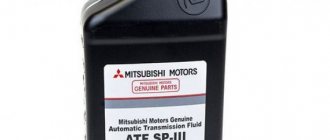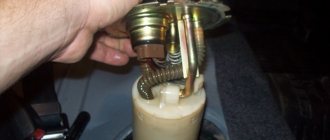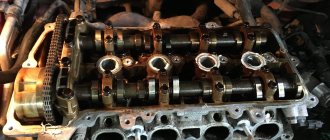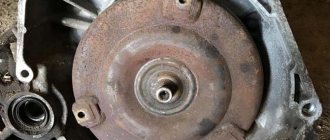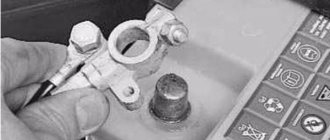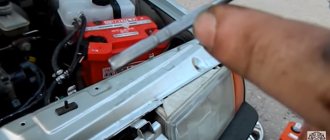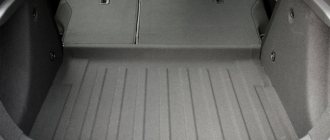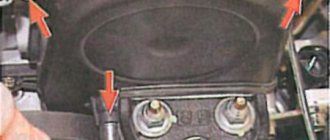For every car owner, sooner or later there comes a time when it is necessary to change the oil in the transmission of your car. This fate does not spare the owners either. Chevrolet Cruze with automatic transmission. About what lubricant is original for this car (that is, it is filled by the manufacturer), is it possible to replace it with analogues and which ones, as well as how to perform the replacement on one's own, we'll talk about it in the article.
Which oil is original for Chevrolet Cruze automatic transmission?
Manufacturers involved in the production of cars use Dextron GM VI with article number 93744589 . Therefore, the best option is to search for a similar working fluid.
Regardless of the volume of the Chevrolet Cruze power unit, compliance with the Dexron VI standard is important for the fluid.
The main parameter that distinguishes lubricants for automatic transmissions of the Dexron VI from lubricants of earlier generations is a decrease in the viscosity threshold and an increase in the variability of operating temperature conditions. Replacement can be made with any liquids that have Dexron VI approval, regardless of which company produced them. In this case, it is possible to mix liquids, the main thing is that they meet the required standard.
There is a time for everything: when to change the gearbox lubricant
A gearbox is a complex mechanism. You should not interfere with its operation if there are no visible reasons for changing the lubricant. The composition poured at production is designed for long mileage.
The oil in a Chevrolet Cruze automatic transmission must be changed when:
- leak;
- production – the degree of production is determined by the color of the ATF.
Each of these problems may be accompanied by the following symptoms: knocking, humming, vibration of the gearbox, incorrect operation - lack of response to gear shifting, delayed shifting, sticking. Moreover, similar “symptoms” are observed in other cases when parts are worn out. Therefore, if the car has an impressive mileage (from about 150 thousand km), it is worth going for diagnostics and finding out the cause of the malfunction - a simple oil change may not help.
The frequency of lubricant changes varies among drivers. It depends on 3 main factors:
- Driving style - drivers who like aggressive driving (sharp starts and stops, sharp turns, etc.) use up all car parts and consumables faster.
- Driving mode. The most difficult driving mode for all components of a car is being in frequent traffic jams.
- Environment - ATF is produced faster if it is constantly exposed to temperature changes, operating at too low and too high temperatures.
Choosing an analogue of the original oil in a Chevrolet Cruze automatic transmission
If there is no financial opportunity to use an original product to replace transmission lubricant, you can consider cheaper analogues that are practically no different in parameters from the original ones:
- The closest analogue of GM lubricant for automatic transmission is Opel ATF DEXRON VI working fluid (part number 1940184) .
- The next budget option is fluid from the Canadian manufacturer for automatic transmissions Petro-Canada Dextron VI (product number DEX6C16).
- In addition, a worthy analogue can be safely called the German lubricant Liqui Moly ATF Top Tec 1200 (article 7502) . The popularity of the lubricant is due to the inherent characteristics of German products such as reliability and quality. Its cost is slightly higher , however, you have to pay for quality.
- Also, to change the oil in a Chevrolet Cruze automatic transmission, it is worth considering the lubricant Mobil ATF Dexron VI (article 071924252233) - an inexpensive, but at the same time high-quality analogue.
How much Cruze automatic transmission oil is required for replacement?
The amount of oil poured into the Chevrolet Cruze automatic transmission will depend on the type of replacement: partial or complete. A complete replacement of the transmission fluid involves completely draining the old fluid, completely flushing the transmission and filling in new fluid. This method will require approximately 6-7 liters of liquid.
With a partial replacement, the amount of fluid poured is less, since this method involves draining the used ATF by only 40-60% of the total volume. Accordingly, the volume of liquid to be filled during partial replacement will be about 3-4 liters.
We also recommend reading the article about the features of automatic transmission oil. In this article, you will learn what transmission oil is for automatic transmissions, why automatic transmissions use a special fluid, and what requirements the automatic transmission oil must meet.
We also note that in addition to oil, you need to choose an oil filter for the Chevrolet Cruze automatic transmission. Since the Cruze automatic transmission is quite complex and the oil filter is located under a cover at the top of the transmission, changing it is not so easy. Therefore, the oil filter is not replaced so often, approximately every 80 thousand km.
The choice of oil filter for a Chevrolet automatic transmission will depend on the year of manufacture of the car. Let us also add that if problems arise associated with switching automatic transmission speeds (shocks, jerks), the filter element is replaced before the deadlines established by the manufacturer.
Automatic transmission oil volume
To completely replace the lubricant in a Chevrolet Cruze automatic gearbox, you need from 7.6 to 8.5 liters of oil. The volume is affected by the type of transmission the vehicle is equipped with.
To change the oil in a 6T30 you need 7.6 6T40 (45, 50) automatic transmission you will need 8-8.5 liters of lubricant.
Therefore, when deciding to replace the transmission fluid, inquire about the type of transmission in your car. There should not be any difficulties with the determination, since this information is contained in the vehicle’s operating instructions If it is missing, you can check the data in the original catalog using the VIN number or car body number.
Required Tools
To replace the transmission fluid, the car owner will need a set of tools and materials, which are shown in the table below.
Tools and materials needed to change the oil
If you change the oil and remove the pan, a gasket will be required. It is also recommended that the car owner purchase an oil filter, but it is not necessary to change it every time the transmission fluid is filled.
Frequency of automatic transmission oil changes
The frequency set by the manufacturer is every 75,000 kilometers.
In addition, during periodic maintenance of the car, you should pay attention to the level and condition of the lubricant. If the vehicle is actively or its operating conditions are far from normal, it is recommended to change the oil without waiting for 75 thousand kilometers, but by reducing this period to 40-60 thousand kilometers.
Filling volumes and replacement interval
How much fresh transmission fluid is required depends on the option for changing it that the car owner chooses. Both complete and partial replacement are possible. The required oil volume is discussed in more detail in the table below.
Overview of oil change options
According to the recommendations of official dealers, transmission fluid must be replaced every 75 thousand km. Since the automatic transmission is sensitive to the condition of the lubricant, it is advisable to reduce the replacement interval to 40-60 thousand km. This is especially true for cars driven in city traffic jams, or when the driver has a sporty driving style.
Change of oil
The algorithm for replacing transmission lubricant on a Chevrolet Cruze is as follows:
- Place the car on a flat surface on an overpass or in a pit. The best option would be to use a lift , since it allows you to get to the transmission as efficiently as possible.
- Place a container to drain the used oil.
- Unscrew the drain plug and wait for the lubricant to flow out of the gearbox.
- Fill in new lubricant through the inspection hole. If you have a dipstick, use it to determine the level of filled transmission oil.
- After filling the automatic transmission with lubricant, start the engine and alternately shift the transmission lever to all positions. If there are no obstacles when shifting, set it to the “P” position and wait about 5 minutes before turning off the engine.
How to change the oil in an automatic transmission with your own hands?
Now about how to change the fluid in an automatic transmission with your own hands. Before changing the lubricant in the machine, its level is checked. If replacement is not planned, then it is enough to top up the consumables.
Level control and topping up
To check the lubricant level in the unit, the breather in the gearbox is closed. The power unit starts, while you must keep your foot on the brake pedal:
- Switch the automatic transmission selector to D mode.
- Wait about ten seconds.
- Use the lever to switch on the next mode and so on through all the gears in ascending order. The procedure is repeated several times, and it is necessary to activate reverse gear. At the very end, without turning off the car engine and turning on the neutral gear or parking mode, unscrew the control plug. It is located directly on the unit.
You can learn more about automatic transmission diagnostics from the video published below (author: Chevrolet Cruze channel).
If a little lubricant has drained, the control plug is screwed in and fluid is added to the system. This is about 0.5-0.7 liters of oil. If the lubricant does not come out of the control hole at all, then add one liter of fluid; before this, the plug should also be tightened. After which the diagnosis is performed again in a similar way. Please note that the oil you will use to add must be preheated.
Oil change algorithm
Changing and filling consumables into the automatic transmission of a 2012 Chevrolet Cruze is performed as follows:
- The vehicle must be placed on a level surface. The work is carried out on an overpass or in a garage with a pit. It’s even better if you can drive the car onto a lift. This will ensure optimal access to the gearbox.
- You need to place a basin or bucket under the drain hole of the unit - used consumables will be drained into the container.
- You should unscrew the drain plug and wait until all the lubricant comes out of the transmission.
- Lubricant must be filled through the inspection hole. If the gearbox is equipped with a dipstick, then it is easy to determine the level of filled lubricant.
- After adding fluid to the gearbox, you need to check the quality of the work performed. To do this, start the power unit, and set the automatic transmission lever to each position one by one. If there are no difficulties in changing gears, set the selector to the parking position and let the engine run for about five more minutes.
1. Unscrewing the plug on the gearbox
2. Pouring consumables into the unit
If the vehicle is equipped with a transmission fluid temperature controller, it is recommended to check the sensor readings as well. Then test the transmission while driving. There should be no jerks or jolts when switching. If the transmission is working correctly, everything shifts smoothly.
How much should I fill?
Separately, it should be said about how much lubricant needs to be poured into the unit. As for volume, to completely replace the fluid in the unit you will need approximately 8 liters of lubricant. However, it is impossible to perform a complete replacement without dismantling and disassembling the box. Therefore, on average, car owners spend about 5-6 liters.
What to do if the Chevrolet Cruze automatic transmission does not have a dipstick?
If there is no level gauge, then when replacing the fluid it is necessary to navigate along the filled cavity of the open opening. When you see that the oil is ready to flow out of the hole, you should stop filling it.
Learn more about the main malfunctions characteristic of automatic transmissions in Chevrolet cars, as well as about the rules for operating automatic transmissions, from the video (author - Chevy Plus TV channel).
How to configure the controller after replacement?
Setting up the controller is a mandatory step when changing consumables. The device must adapt to the operation of the unit with the new viscosity. The setup process goes like this:
- Start the car's power unit. Activate all gears on the transmission from park to neutral speed.
- Wait a few seconds.
- Set the gear lever to D mode.
- Wait a few more seconds and return the selector to the neutral position. The procedure is repeated at least three times, which will allow the controller to be trained.
In some cars, in practice everything works fine. But if something goes wrong, then when switching transmission modes, jerks and jolts may appear, which will lead to uncomfortable driving of the car as a whole. The process should be carried out with the transmission fully warmed up to maximum temperatures, since the controller is optimized to the temperature regime at which training is carried out.
Partial oil change
Independently replacing the lubricant in a Chevrolet Cruze automatic transmission is impossible without the following materials and tools:
- approximately 5-6 liters of gear oil (original or equivalent);
- tools (wrenches);
- funnels, watering cans, or oil syringes, with which you will fill the gearbox with new lubricant;
- clean cloth;
- containers for collecting used oil.
A partial oil change in an automatic transmission is performed as follows:
- the car is installed on a pit or on a lift (overpass);
- a container is placed under the drain hole into which the used lubricant will be drained;
- transmission protection is removed
- is unscrewed and the waste is drained;
- after the working fluid has drained, the plug is put in place;
- after determining the volume of drained oil, new lubricant is poured into the filler hole (it is more convenient to do this using a watering can or syringe;
- is unscrewed to check the level of the filled liquid (if the lubricant begins to flow out, there is no need to fill it further).
Before closing the drain plug, check the condition of the seal ; it may also need replacement.
Please note that the exact level of the working fluid can only be determined by warming up the transmission. To do this, you need to start the engine, move the gearbox lever to different positions, and then set it to the parking position and leave it for 5-10 minutes.
Time to fill: how to do it correctly
Lubricant replacement can be complete or partial. From the names it is clear that with a complete change, all the lubricant is completely removed and a new one is poured, and with a partial change, only a certain proportion of it (about 40%) is added.
Carrying out a complete replacement in a home garage is a risky procedure. It will not be possible to drain all the oil, since approximately 60% will remain in the torque converter. You can drive it out of there using a special device that supplies high-pressure air to the gearbox. During this process, the oil filter will become clogged, as all contaminants and rising sediment from the parts will pass through it. Therefore, when completely replacing, it is necessary to change the filter as well. But to do this in the Chevrolet Cruze, you will have to disassemble the automatic transmission. Only an experienced auto mechanic can perform such a procedure. The cost of services of a good specialist who will not break, but actually fix the box, makes disassembling the component just for the sake of changing the oil impractical. Such operations are performed when gearboxes break down.
Partial change of composition is a good solution if you don’t like how the component works, there are minor malfunctions or inconveniences such as noise or vibrations. You can do the work yourself. But it is always safer for the car to turn to professionals.
DIY partial replacement
To replace, you will need access to the bottom of the car, so you need to use a pit or overpass. A set of wrenches, a special extended watering can, a wide container with a volume of 4–5 liters, and 6 liters of gear oil will be useful for this work.
Before work, you need to warm up the car well by driving it for about 10 km or leaving it idling for 15–20 minutes. The procedure for working with a Chevrolet Cruze to change the automatic transmission oil is as follows:
- Unscrew the transmission drain plug and immediately replace the container. The cover is located on the bottom of the car. It is quite difficult to confuse it with something else.
- Wait for the ATF to drain - this may take 15-20 minutes.
- Screwing the plug into place is very important if you don’t want to pour 5 liters of lubricant on the ground.
- Pour new oil through the upper dipstick hole and turn on the engine. Access to the hole is a little difficult, so a special watering can is needed. If you cannot find a suitable device, you can build it from a two-liter bottle and a hose.
- Activate different transmission modes and switch to parking. Leave the engine idling for 5 minutes. If there is a system for measuring the temperature of the lubricant, wait until it warms up.
- Check the level using the dipstick.
Partial grease replacement has been completed. If problems with jamming, noise, vibration, and incorrect operation have not disappeared, you need to contact a service center and carry out diagnostics - most likely, the problem was not in the oil, or the change was carried out incorrectly.
“There’s no dipstick here!”
Many Chevrolets of this model sold on the Russian market are equipped with an automatic transmission in a modification without a dipstick. In this case, you should take two identical containers. Drain the liquid into one, pour the same volume into the second. Other actions remain unchanged. After completing the work, it is necessary to reset the indicator responsible for diagnosing lubrication in the automatic transmission.
Changing the oil in a Chevrolet Cruze automatic transmission without a dipstick
Many Chevrolet Cruze models presented on the Russian market are not equipped with a dipstick for checking the lubricant level in the automatic transmission.
In this case, when changing the lubricant, you can use 2 options:
- pour transmission fluid until it is not visible in the open neck, that is, until it begins to flow out ;
- use 2 identical basins or jars ; in this case, the volume of drained and refilled liquid will be identical.
All other steps for replacing transmission lubricant will be similar to those described earlier.
Selection of oil for manual transmission Chevrolet Cruze with 1.6 and 1.8 liter engines
The manufacturer recommends using General Motors branded oil. Its article number is 93165290. It has a viscosity of SAE 75W-85 and complies with the GL-4 standard. The official dealer does not recommend the use of other lubricants.
Experienced car owners advise not to overpay for branded oil, the cost of which reaches up to 2,000 rubles. The table below presents good analogues from famous brands, the quality of which is not inferior in properties to the original. When choosing oil for a manual transmission, you need to check its compliance with API GL-4, GL-4+ or GL-4/5.
Well proven oil
An important indicator is the thickness of the oil. The higher its density, the thicker the film is formed on the contacting surfaces. This leads to reduced wear and damping of shock loads. The disadvantage of thick oil is a decrease in transmission efficiency. It has been experimentally established that for the Chevrolet Cruze it is optimal to use 75W80 and 75W90 oils. It is also possible to use a lubricant with a viscosity of 80W90.
The design of the Chevrolet Cruze transmission includes parts that are made using copper. A chemical reaction occurs on their surface upon contact with oil. The image below illustrates the effect of grease on copper.
The appearance of oxides on the surface of copper parts when exposed to oil
Choosing oil for Chevrolet Cruze
Choosing oil is a responsible procedure for every driver. The composition should be selected based on its tolerance parameters, degree of quality and other information. But the most important parameter is the viscosity characteristics, which determine whether the oil is adapted to a certain temperature range. The optimal viscosity level for the Chevrolet Cruze manual transmission is indicated as 75W90 or 80W-90.
As for choosing a brand, the manufacturer advises buying only original oil from the GM concern. But the choice remains with the buyer, and today many prefer analogue oils. Their quality is comparable to the original product, and there is no doubt about it. At least if you choose from the most famous brands - Lukoil, Castrol, Mobile, Shell and others.
There are three types of oil - synthetic, semi-synthetic and mineral. Naturally, synthetics are most often purchased for the Chevrolet Cruze. It is more resistant to frost and lasts longer. With high mileage, you can switch to semi-synthetics and save a lot of money.
checking the oil level in the automatic transmission - logbook of the 2013 Chevrolet Cruze 1.8 AT “TOP” on DRIVE2
I don’t have a pit or a lift, but you can do without them OPTIMAL WARMING IS SURE because if the gearbox is very hot, the level will be high, and if the gearbox is not warmed up enough, the level will be low... I did this when the outside temperature was plus 15 degrees, I drove about 7 km IN A CALM THIS IS IMPORTANT. then, without turning off the engine, jacking up the left front wheel, removed it, the position of the automatic transmission handle is in P mode, then lowering the car with a jack to exactly horizontally, unscrew the plug with a key set to 11, it is located under the fastener coming out of the gearbox, oil poured out of the hole, if this does not happen, then fill the oil through the top cover .
Results
- Be careful as the oil may still be hot and will spill. If you lower one end of the pan first, you will be able to direct the flow of fluid into the drain pan.
- Reinstall the new gasket. I usually use a lot of bolts to hold the gasket in place while you install the cover. Tighten them carefully to ensure the cap is evenly tightened. Now we can add new automatic transmission fluid.
- Be careful not to overfill the container. Add mixture about halfway up the dipstick, then go for a 10-minute drive. Stick to what the owner's manual recommends and you can't go wrong.
- If you only want to change your Chevrolet Cruze automatic transmission oil, simply use the oil pump to drain the oil. You will leave a small amount of transmission oil at the bottom of the pan and filter. I was able to get 3.5 quarts out using a vacuum oil pump.
- Consult your service manual for recommended replacement intervals. Changing it more often will not harm your car. Just time and additional costs.
- With the parking brake applied and your foot on the brake pedal, start the engine and move the shift lever through all gear ranges. Allow sufficient time for each gear to engage.
- An overflow condition of transmission fluid in a storage tank can cause misalignment and/or engagement problems and/or possible damage to the transmission. High fluid levels may be caused by overheating.
Breakdowns and oil leaks from automatic transmissions
Chevrolet annually presents statistics on breakdowns of its vehicles at the Avto-motor show Los-Angeles. From it we know that 75% of all automatic transmission failures in Chevrolet Cruze 1.8 models occur due to leakage and lack of lubricant in the gearbox.
In order to avoid automatic transmission breakdowns, you should systematically check the lubricant level in this unit. It will allow you to find out in a timely manner whether the gearbox needs to be topped up with oil and whether there are any leaks (if the automatic transmission leaks, due to a lack of lubricant, it turns black).
To check the lubricant and, if necessary, change the oil in the automatic transmission on a Chevrolet Cruze 1.8, you must:
- Shut off the breather in the automatic transmission.
- Then start the engine while holding the brake pedal.
- Later, switch the transmission to D mode.
- Wait 10-15 seconds.
- After 10-15 seconds, switch the gearbox to the next ascending mode (so all gears are ascending).
- This procedure is repeated 2-3 times (do not repeat it more than 3 times, otherwise the automatic transmission will go into emergency mode).
- Do not forget that when performing this procedure you must also use reverse gear.
At the end of the procedure, put the car into parking mode. Then unscrew the valve and check the amount of lubricant mixture with a dipstick.
Automatic transmissions are becoming increasingly common in cars exported to Europe and the CIS countries. Here it is in demand for its advantages. Obviously, an automatic transmission is much more convenient than a manual transmission. However, it sometimes has a number of breakdowns.
All automatic transmission problems are divided into two groups:
- Damage to electronics;
- Damage to the hydraulics and mechanics of the automatic transmission.
Among the breakdowns in electronics, the following can be identified that occur frequently:
- failure in the electronic unit;
- breakdown of transmission and engine sensors (in certain configurations, engine and gearbox sensors are combined into a single network);
- electrical wiring breaks;
- breakdown of executive parts.
It is worth noting that if a problem occurs in the electronic part of the gearbox, the control unit starts emergency operation. This operating mode guarantees the functioning of the gearbox even in the event of serious damage.
For various types of damage, various auxiliary programs are provided that are designed to help the automatic transmission continue to function. In the event of serious breakdowns (such as failure of the control unit, failure of actuators, etc.), the gearbox is switched to emergency mode.
We recommend: What to do if the wipers on a VAZ-2110 do not work: possible reasons
In emergency mode, the automatic transmission is automatically transferred to 3rd gear. It ensures safe movement of the car on the road. This will allow the car owner to get to the nearest place where he can carry out repair work himself, or use the services of a car service.
Hydraulic and mechanical breakdowns of the automatic transmission can be as follows:
- deformation of the guide gears inside the automatic transmission (occurs due to contamination of the automatic transmission with used lubricant, resulting in jamming and bending);
- rupture of brake bands and their fastenings (occurs as a result of incorrect adjustment of the automatic transmission);
- breakdown of the torque converter (occurs when there is a hidden problem in the electronic control unit);
- breakdown of torque converter fasteners;
- fracture of the fastenings and seat of the torque converter stator (all due to the same malfunction in the electronic unit);
- burnout of gear bushings;
- friction wear;
- cracks in the oil pump (occurs when using low-quality lubricant, or using oil with an excessively high viscosity).
Practice shows that one automatic transmission malfunction can flow into another, and subsequently can completely damage the gearbox.
Case study:
The service center received a car, the diagnostics of which showed that the oil filter needed to be replaced. When replacing it, it turned out that the fasteners and seat of the valve were broken, and particles of used oil got into the automatic transmission. The consequence of this was the need to completely clean the gearbox of used lubricant. In addition to everything, during the analysis, another problem emerged. Due to unfiltered particles entering the automatic transmission, the gear guides were damaged and must be replaced with new ones.
Lubricant contamination has a huge impact on other automatic transmission systems. If you do not immediately pay attention to these problems, you may soon find yourself with a completely failed gearbox.
Malfunctions, regardless of category, have the same causes of failure:
- Wear of individual gearbox components.
- Filling with lubricant with a higher degree of viscosity and technical characteristics that the car manufacturer does not recommend for use in this automatic transmission.
- Carrying out repair work during which the car owner uses low-quality consumables. Usually this is a conscious choice of the car owner who takes this step in order to save money.
- Carrying out maintenance of the gearbox with increased intervals between the completed maintenance and the one that is being completed.
- Carrying out repair work by a person who is not properly qualified in this field.
- Incorrect driving style, in which the gearbox is subjected to excessive overload.
You can tell if your automatic transmission is malfunctioning by the way your car drives on the road. Even a novice motorist can conduct an initial check of the Chevrolet Cruze 1.8 automatic transmission.
Typical automatic transmission breakdowns and their elimination
Due to its design features, an automatic transmission presents a number of difficulties for doing repairs yourself, so in case of breakdowns you must contact a service center. However, there is a list of malfunctions that the car owner can solve with his own hands.
- Symptom: The indicator on the dashboard does not correspond to the position of the pile on the transmission.
- Reason: malfunction of parts of the gear changing mechanism.
- Remedy: Check the electronic part of the gearbox for errors.
- Symptom: the engine starts when the gearbox is in the pile position and is not at the NP marks
- Reason: broken gear shift mechanism
- Remedy: replacing the gear shift knob bearing.
- Symptom: oil is leaking from the automatic transmission.
- Cause: damage to oil seals; Damage to the bolts securing parts of the gearbox housing.
- Remedy: replace the O-rings; Completely replace the bolts of the automatic transmission housing.
- Symptom: The automatic transmission does not downshift.
- Cause: damage to the rod structure; levers are broken.
- Remedy: complete replacement of damaged parts.
However, most serious damage and malfunctions of the automatic transmission cannot be done with your own hands. Such breakdowns are carried out exclusively in the service centers of car dealers, with an entry in the technical passport of the car about the repairs performed on a specific component of the car.
- Malfunction: the car does not move in any position of the gear shift lever.
- the oil filter is dirty;
- The car does not move in any position of the gear shift lever.
- the oil filter is dirty;
- When switching automatic transmission modes, the car stalls.
- broken bushings in the clutch drum housing (cannot be repaired, the entire drum assembly must be replaced);
We recommend: MAZ spare parts
In addition to the above breakdowns, there are others that are discovered during a complete disassembly of the Chevrolet Cruze 1.8 automatic transmission. Among the most common problems during complete disassembly of an automatic transmission are the following:
- metal shavings between the guides;
- cracks on gears and others.
How to change lubricant
Purchase the correct brand of lubricant (75w90) and oil filter before starting maintenance. A partial replacement of gearbox lubrication in a Chevrolet Cruze will require 5.6 liters of fluid, and a complete replacement - about 7.5 liters. This procedure is performed once every 100,000 km or more, in contrast to manual transmissions, where the lubricant is replaced 2-3 times more often than 1.5-1.7 liters. In order to perform these simple steps, you will need ordinary rags, a basin or other vessel for draining used liquid, and a basic set of keys. If everything is ready, you can begin the process itself. First, drive the car into a pit in the garage. Then, at the bottom of the car, carefully unscrew and remove the drain plug from the exhaust transmission.
Changing the lubricant in the A18XER engine
The lubrication system of the 1.8 liter 141-horsepower Chevrolet Cruze engine is somewhat different from the popular 1.6 liter F16D3 power unit in our country, installed mainly on Daewoo Nexia and Daewoo Gentra cars. In particular, the lubrication system of the 1.8 liter gasoline power unit has a non-removable oil filter with a replaceable filter element. List of required tools:
The process of filling new motor lubricant
- 24mm wrench;
- special torx key T45;
- keys for removing crankcase protection;
- 10 l bucket;
- oil funnel.
List of required consumables.
- Oil meeting ACEA A3, C3 or API SM, SN standards.
- Oil filter (filter element) GM 93185674.
- O-ring for drain plug GM 90528145.
- First you need to start the engine, warm it up to operating temperature and drive the car onto a lift or pit.
- Then you need to turn off the engine, apply the parking brake and remove the crankcase protection.
- After this, you need to place a bucket under the drain hole and unscrew the plug of this hole using a T45 key.
- When the used oil is drained, you need to unscrew the oil filter cap using a 24mm wrench and carefully remove the old filter element. It is important not to get burned.
- After this, you should wipe off the leaked liquid from the surface of the cylinder block, insert the filter element into the oil filter and screw its cap back on.


